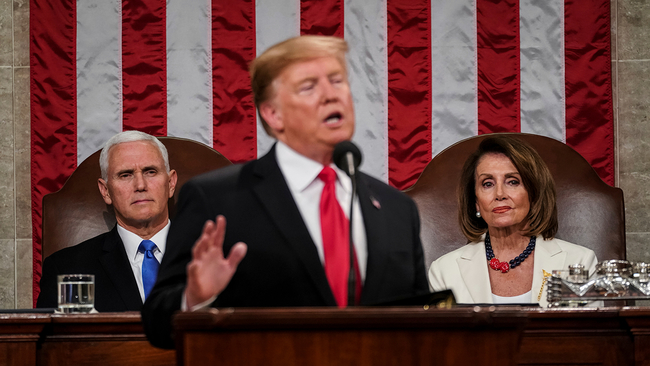
The facts behind the assertions
During his State of the Union address, President Trump made a number of assertions that can be fully supported or unsupported by further context.
During President Donald Trump’s State of the Union address on Feb. 5, he made dozens of assertions. With an agenda that covered over 20 topics, there was a lot of information there to be uncovered.
Throughout his hour-and-a-half long speech, he touched on topics ranging from unemployment, the economy, immigration, foreign policy, crime, and more.
When undressing the many checkpoints the president made during his address, it’s important to have context. We can look at the things that have happened since Trump took office, but we must also look at what can be more directly correlated to his administration and what is more of a result of a trend that had been years in the making.
When Trump addressed the “unprecedented economic boom”, the fact that unemployment was at a 50-year low, he began with the claim that, “More people are working now than at any time in our history — 157 million,”
While that may be a fact, it is also a fact that the U.S. population is larger than ever before. Therefore, the best way to calculate the unemployment rate is in comparison to the population, not simply the total number of working individuals. According to Fred Economic Data, the employment to population ratio is at 60.7, the highest in more than 10 years, not ever before.
Trump also claimed that the African-American, Hispanic-American, and Asian-American unemployment rate as at their lowest levels ever.
While this statement may be true, unemployment percentages for blacks, Hispanics, and Asians have been on a decline since 2010.
The same case can be made for another assertion Trump made regarding women in the workforce.
“No one has benefited more from our thriving economy than women, who have filled 58 percent of the new jobs created in the last year,” he said. “All Americans can be proud that we have more women in the workforce than ever before.”
Again, when detailing the impact of women in the workforce, we can’t simply look at the total number of women in the workforce.
According to the Bureau of Labor Statistics, the percentage of U.S. women in the workforce or looking to enter the workforce was highest in April 2000, under President Bill Clinton, at 60.3 percent.
RELATED CONTENT
Perhaps the most talked-about component of Trump’s agenda was his stance on border security, a stance that resulted in the longest government shutdown in U.S. history.
While continuing his rhetoric about the need for a border wall, Trump used El Paso, Texas to support his claim.
“The border city of El Paso, Texas, used to have extremely high rates of violent crime — one of the highest in the country, and considered one of our nation's most dangerous cities,” said Trump. “Now, with a powerful barrier in place, El Paso is one of our safest cities."
“Simply put, walls work and walls save lives,” he continued.
However, it is not a fact that the border fence is directly responsible for El Paso’s reduced crime rate.
According to crime reports from the El Paso County Sheriff’s Office and the El Paso Police department, crime in El Paso peaked in 1993, while the wall was constructed in 2009. El Paso saw a 34 percent decrease in crime between 1993 and 2006. However, in the five years afterwards, crime increased by another 17 percent.
From those numbers, it’s hard to credit the building of a fence for decreasing any crime within the city. It’s also seems short-sighted to imply that building a barrier would be the cause of less crime.
When breaking down the major points a president makes throughout a State of the Union address, it’s important to have context. Any assertion can be supported or unsupported by simply having additional facts available. The president should not be given full credit or full blame for a number of conditions, simply because many result from a trend of years, sometimes decades.











LEAVE A COMMENT: